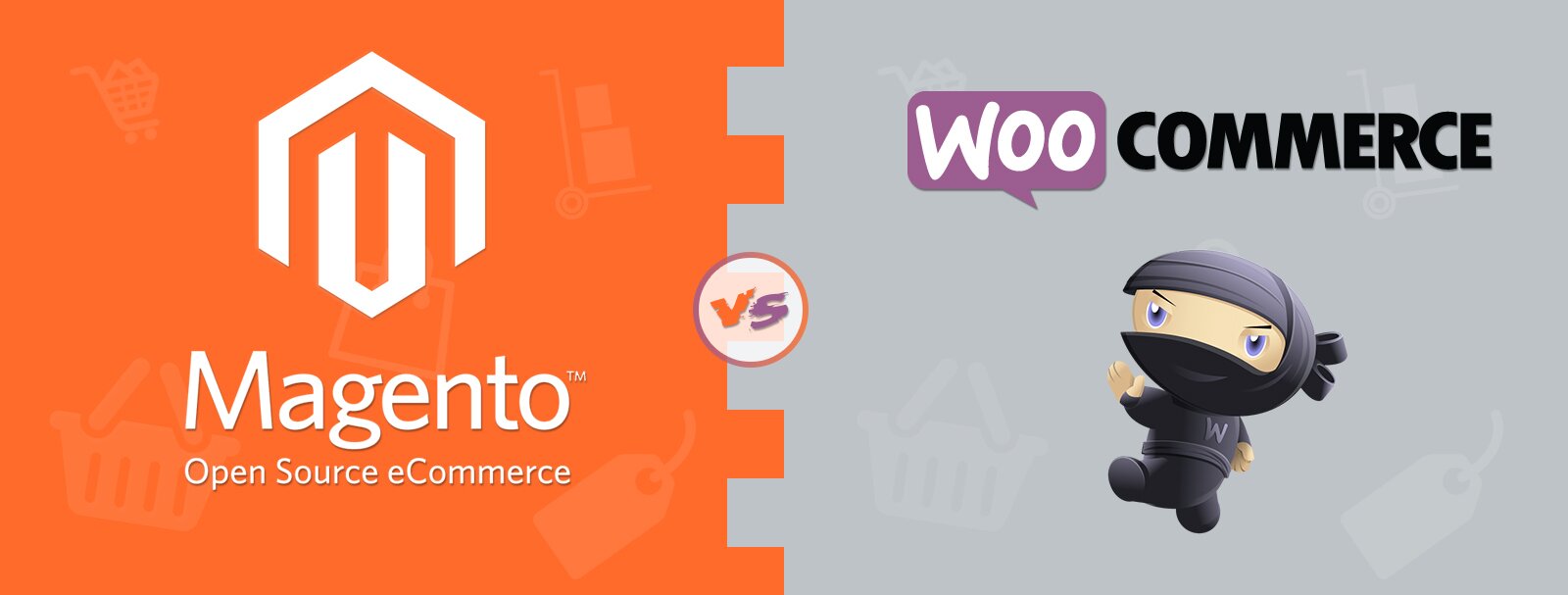- 15 August 2021
- Website Development
- Reading time:7 min
eCommerce Platform Magento vs Woocommerce
#39
Amongst all e-commerce platforms, magento websites and WooCommerce sites are the most popular and in demand.
Amongst all e-commerce platforms, magento websites and WooCommerce sites are the most popular and in demand. Magento account for 29.1% of the total market share, according to Alexa's research, with WooCommerce slightly behind at 26.5% However the source of blogger debates is which really is the better one given their tight and pretty much barely noticeable statistic difference? Both have their strengths and suitabilities for different needs and a strong backing from reputable sources: Wordpress for WooCommerce and eBay for magento website design. So which one is the true leader? eCommerce platform Magento, or eCommerce platform WooCommerce? Acidgreen finds out for you.

The Similarities
Open Source
To start off with, both are open source products. This basically means that the original code is freely available to anyone and can be built on or modified to create a product that works specifically for them. This also means that you already can't go wrong with either platform. The reason Magento and WooCommerce has such a large following is because open source softwares creates an appreciation for sharing. Developers have the freedom to create and share their own versions of the software, a creative aspect that's also worth noting and valuing. As a new business owner, this is a crucial feature as 1) the initial product is free to use so you don't have to compromise quality over offsetting costs and 2) you'll have an abundance of help from the community.
Unlimited customisation options.
The burning question you may have is how they make their money if they offer a free product. The answer: extensions. Mandatory extensions that you will likely need to purchase over time as your business grows in order to keep up with the influx of consumers and competitors. For instance, if you want to customise the branding of your website, you will need to purchase this ability through plugins or a developer's time. There are options where you a company can host your open-source website - you can quickly build your online store with a few button clicks but the Catch-22 is that your customisation options are severely limited. So be sure to bear that in mind.
The Differences
Setting Up
Starting up any business will always come with its fair share of hurdles, but you don't want the e-commerce platform you choose to be one of them. It goes without saying that if you're already a WordPress user and want to add an e-commerce element to your site, it makes sense to choose the e-commerce plugin, WooCommerce. You're already set up and familiar with the interface, so you won't have to go through the trouble of familiarising yourself with a new platform or migrate your site.
Features
With any e-commerce platform, you want to make sure that it prioritises what you need to ensure your business attracts and keeps your customers - surefire way is to be able to showcase your products well. Shopping cart facilities, infinite product upload allowance and sort-and-categorise functions are a must for this purpose. The good news is that both Magento and WooCommerce support all these features. But when it comes to taking your website to the next level, which platform comes out winning?
Magento has the upper hand in this case. You have the ability to cross-sell, or up-sell your products, compare products, add discount codes and use an advanced filter to navigate your products. Plus, if you have more than one store, you can view them all from the same dashboard, making your job exceptionally easier.
Costs
Initially, both platforms are available for free to download, meaning you can start building your shop straight away. However it's the features you need to pay for that really makes your site attractive, such as offering a full range of payment options other than PayPal and direct bank transfers. Here's where the lines blur between the two platforms: WooCommerce is highly limited on these basic options and plugins you need, but magento enterprise requires you to fork out a bit of dough in order for you to properly grow your website and offer a superior shopping experience. In addition, you'll also need to consider having either a magento agency or in-house techie to assist you with managing your magento website as it can can increasingly complicated for someone with limited coding skills.
The Verdict?
At the end of the day, you're comparing an apple and a pear - both do the job perfectly to an extent, but it's where you're at with your business that the best choice becomes more apparent. If you are simply a new start up with a limited budget and staff, WooCommerce is perfect for you. It does the job of selling your product and as you grow, you can add as many customisable plugins as available to continuously build a better experience for your customer. However, a magento company is highly recommendable if you are a larger business or agency looking to bring your company to the next level, compete with e-commerce giants and come out swinging.
–
Acidgreen is an award winning Magento Sydney Company with over 15 years of e-commerce experience. Our certified magento developers and designers are experts in magento web development and are highly qualified to create aesthetically pleasing magento store and websites that generate the highest amount of conversions and provide the best ROI. For more information on our magento commerce and enterprise expertise plus how to get started with Acidgreen’s Magento Development Sydney services contact us today.
Related articles


